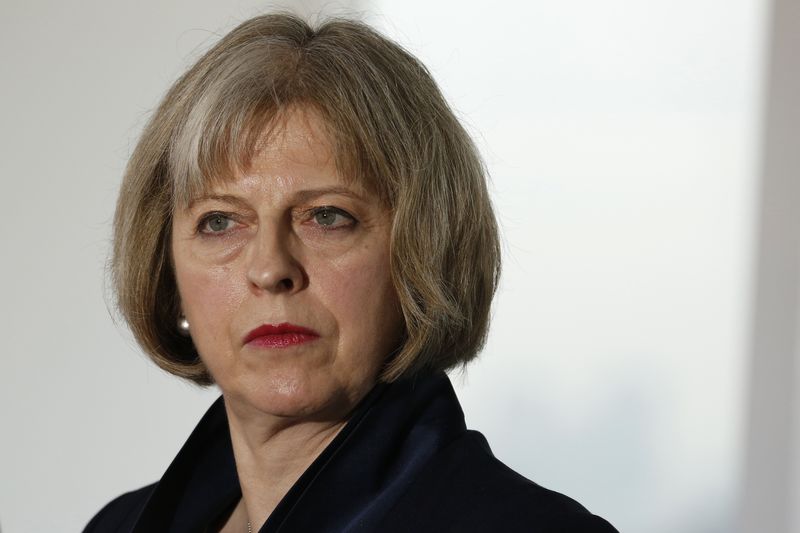 © Reuters. May Faces Brexit Attack as Corbyn Pressed on Second Referendum
© Reuters. May Faces Brexit Attack as Corbyn Pressed on Second Referendum(Bloomberg) — Theresa May’s fiercest critics will spell their Brexit demands on Monday, just as the embattled Conservative leader heads into a potential showdown with her top ministers.
How the prime minister emerges from those domestic battles — further weakened or limping on — is a key question after last week’s bruising put-down by European Union leaders. Her defiant response has given her little respite, with speculation about challenges to her leadership and the Sunday Times reporting plans for a possible snap election in November.
May will convene her Cabinet hours after her former Foreign Secretary Boris Johnson and former Brexit Secretary David Davis endorse an alternative plan for a much harder departure. The Institute of Economic Affairs will publish a blueprint arguing that the U.K. should seek a free trade agreement modeled on the one Canada just struck with the EU.
It’s unfortunate timing for May, who on Friday accused the EU of disrespecting her and offering options that were unacceptable. The tone was welcomed by the Brexit hardliners in her party, but they still wanted her to change position.
“Her stirring speech does not make a bad plan good, but it does show that she has the willpower to deliver something better,” Jacob Rees-Mogg, chairman of the pro-Brexit European Research Group, wrote in the Mail on Sunday.
Up North
Meanwhile, in Liverpool, the opposition Labour Party is creating a different kind of Brexit problem for May by leaving the door open to supporting a second referendum on leaving the EU. It’s something that May gets asked repeatedly and on Friday outright rejected.
Labor Leader Jeremy Corbyn on Sunday repeated that he’d rather have an election, but many activists want him to take a stronger line, and he said he would accept whatever this week’s conference decides.
“Our preference would be for a general election,” Corbyn told the BBC’s Andrew Marr Show. “I’m there elected as leader of this party in order to bring greater democracy to this party. Obviously I’m bound by the democracy of our party.”
It was only last year that the country went to the ballot box, and that was a miscalculation by May, who wanted to bolster her majority in Parliament and instead ended up losing it. Now, the Sunday Times is saying aides to May have discussed the possibility of a November vote to get her out of her current bind.
Go Harder
According to the paper, the prime minister would use such an election to seek a mandate for a harder Brexit stance. To take such a step she’d need the support of Tories, and even if they backed her plan, they might well want someone else doing the campaigning. The suggestion that anyone around May was planning such a thing was rejected by her office.
Monday’s Cabinet meeting is due to discuss a range of issues including what immigration policy the U.K. should adopt after Brexit. Given the setback in Salzburg, May could be given a hard time by those ministers who want more distance from the EU.
It remains to be seen if they rally around her or mount an attack. The Daily Telegraph reported Monday that majority of the Cabinet now supports moving toward a Canada-style trade deal.
In a week’s time the Conservatives will hold their own annual conference, where the topic of Brexit will once again be hard to dodge.
Avoid Brexit Talk
At Labour’s gathering, senior figures have tried to avoid talking about Brexit. The party is split between those who regard leaving the EU as an economic disaster and those who fear alienating voters who backed Brexit.
Corbyn himself has been suspicious of the EU for most of his career, and during the referendum campaign he only campaigned half-heartedly to stay.
At an open-air rally on the banks of the Mersey on Saturday night, the question of EU membership was barely mentioned from the platform. One trade unionist called for Britain to get right out of the EU; Corbyn himself gave the subject two sentences of his speech.
But in the same spot the next day, campaigners for a second referendum gathered to urge Labour to take a stronger anti-Brexit position.
At a closed-door meeting on Sunday evening, delegates debated the wording of the Brexit motion that they’ll vote on Tuesday even as the party leadership pushed for something that doesn’t commit Corbyn to anything.
Source: Investing.com




























